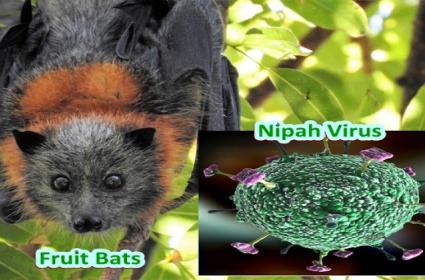Nipah Virus: Emerging Challenge to Medical Fraternity

K Jayadev
The recent news of 10 people dying of Nipah Virus in Kerala has left everyone shell-shocked. The medical fraternity in the country has suddenly woken up to a new disease that has left people not only in Kerala but the rest of the country worried and afraid.
As per the National Institute of Virology, Pune, Nipah Virus is the sole cause of the in Kerala. Rajiv Sadanandan, Kerala’s health secretary, has stated that the government has started its preparation towards fewer deaths and that people should not panic. An unheard of virus, NiV is yet to be understood by many.
What is Nipah Virus?
According to the World Health Organisation (WHO), Nipah Virus is a newly emerging zoonosis that causes a severe disease in both animals and humans. This virus was first identified in Malaysia and Singapore in 1998. At that time, it was primarily caused in pigs and through them got transferred to humans. Nipah Virus infected as many as 265 people then, out of which 40 per cent were taken under intensive care due to the infection having spread severely. As quoted by the WHO, the natural host of the virus are fruit bats of the Pteropodidae Family, Pteropus genus.
The virus can be transferred through infected bats, pigs or humans who have been infected. In 2004, humans who consumed the date palm sap infected by fruit bats, caught the virus as well. Humans who were infected by other humans were reported in Bangladesh and India.
On the other hand, U.S. Center for Disease Control and Prevention (CDC) says that outbreaks of Nipah Virus occurs in Bangladesh almost every year, and there have been several outbreaks in India prior to the current one. The death rate from the Nipah Virus is estimated to be about 75 per cent.
Who gets infected?
The Nipah Virus usually spreads to humans who have direct contact with animals, especially fruit bats or pigs. It can also spread between people, often between family and caretakers of people who are infected. This is how the Kerala nurse who was treating Nipah Virus affected patient got infected and even died.
Presently, the outbreak was in Kerala where 10 people have died and nine others have been identified as persons infected with Nipah Virus. These nine have been quarantined, while many persons who have been acquaintance with the affected are also under scrutiny. The Kerala outbreak of Nipah Virus is being said to be through bats.
Signs and symptoms
Human infections range from infection, acute respiratory infection (mild, severe) and fatal encephalitis. Infected people initially develop influenza-like symptoms of fever, headaches, myalgia (muscle pain), vomiting and sore throat. This can be followed by dizziness, drowsiness, altered consciousness, and neurological signs that indicate acute encephalitis. Some people can also experience atypical pneumonia and severe respiratory problems, including acute respiratory distress. Encephalitis and seizures occur in severe cases, progressing to coma within 24 to 48 hours. The incubation period (interval from infection to the onset of symptoms) is believed to range between from 4-14 days. However an incubation period as long as 45 days has been reported.
Treatment
There are currently no drugs or vaccines specific for NiV infection although this is a priority disease on the WHO R&D Blueprint. Intensive supportive care is recommended to treat severe respiratory and neurological complications.
The WHO says, since there was no vaccine, the only way to reduce infection in people was by raising awareness of the risk factors and educating people about the measures they can take to reduce exposure to and decrease infection from NiV.



















